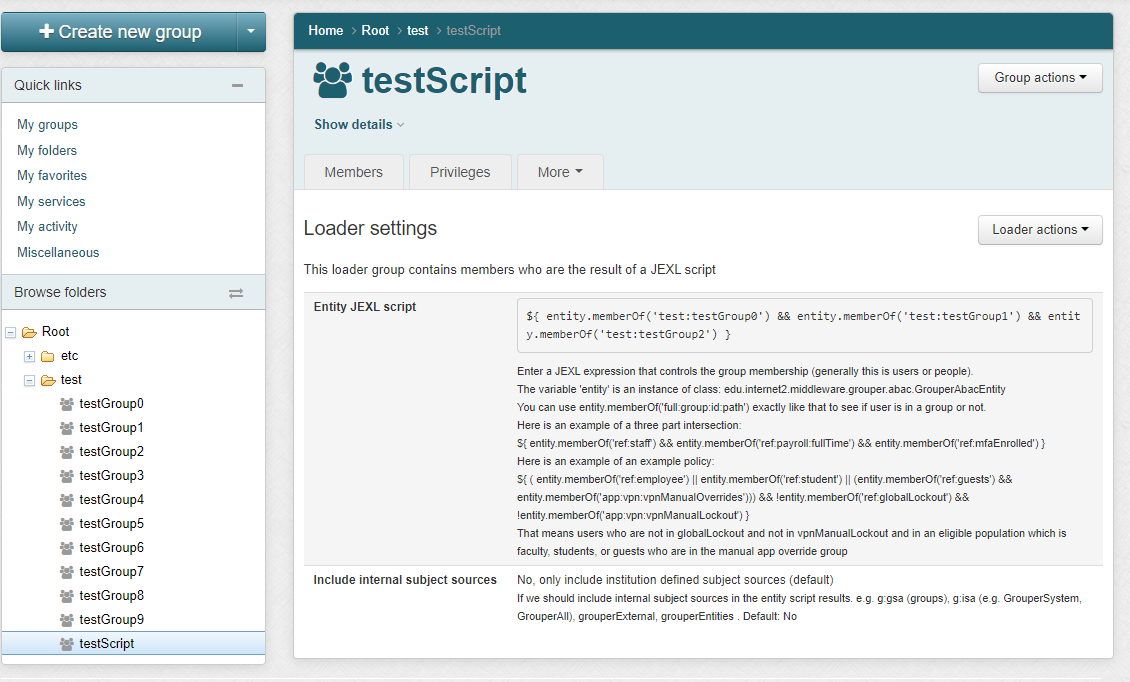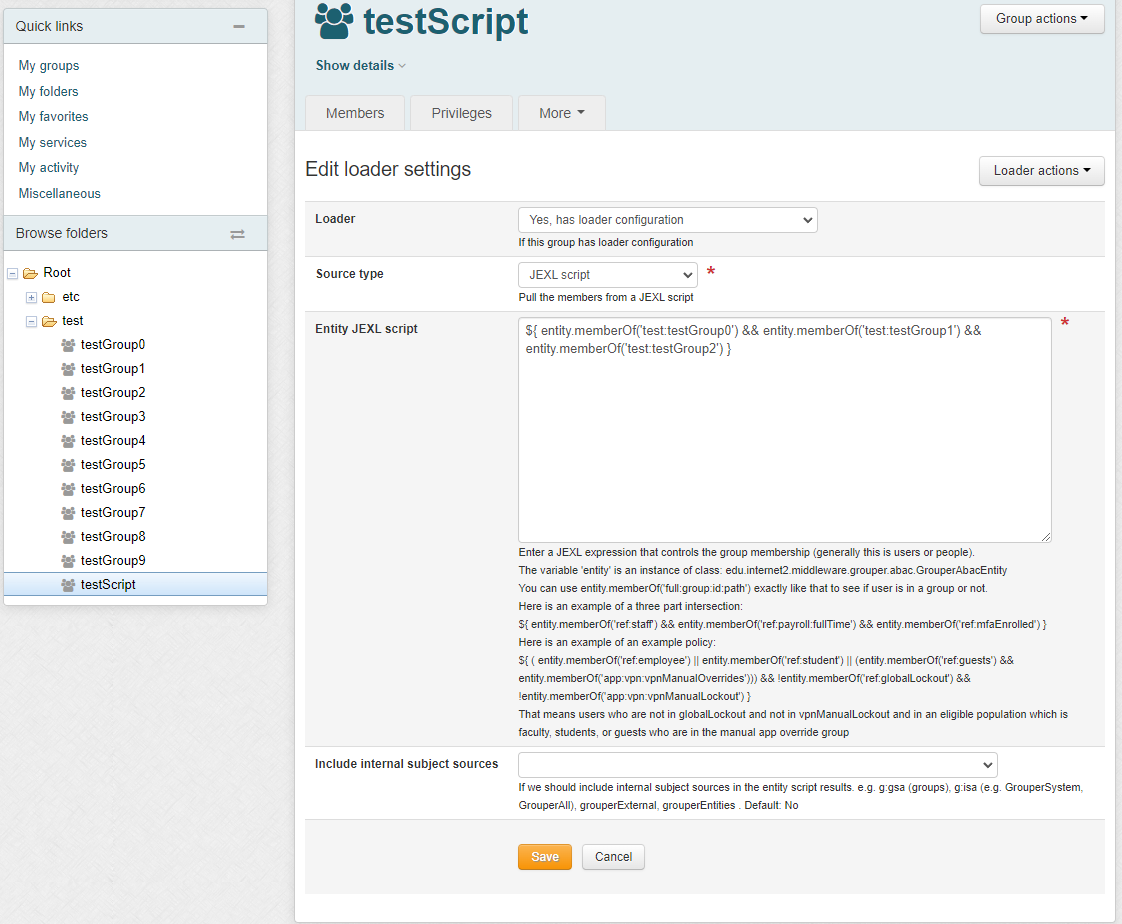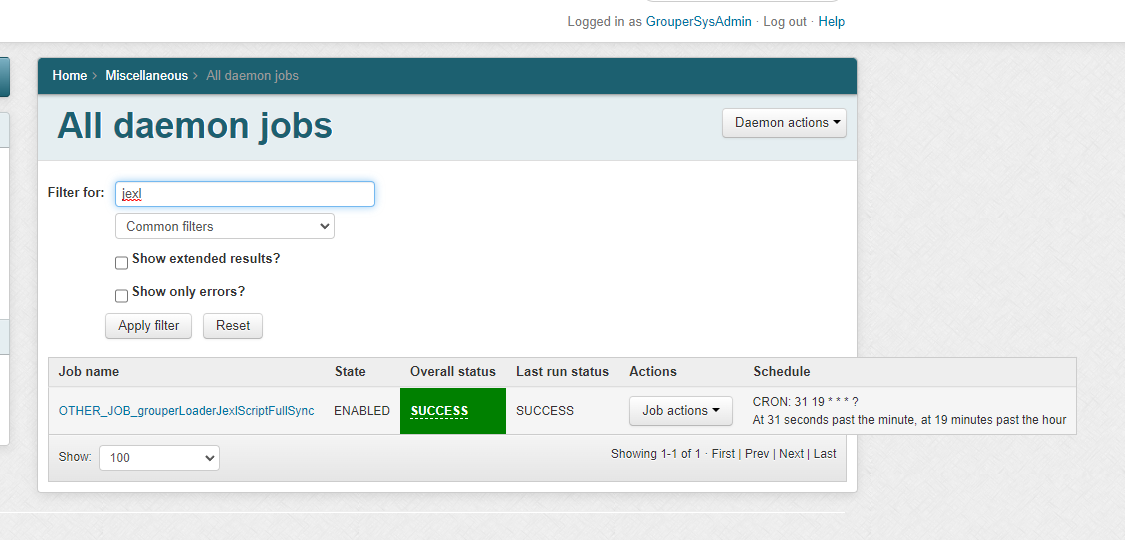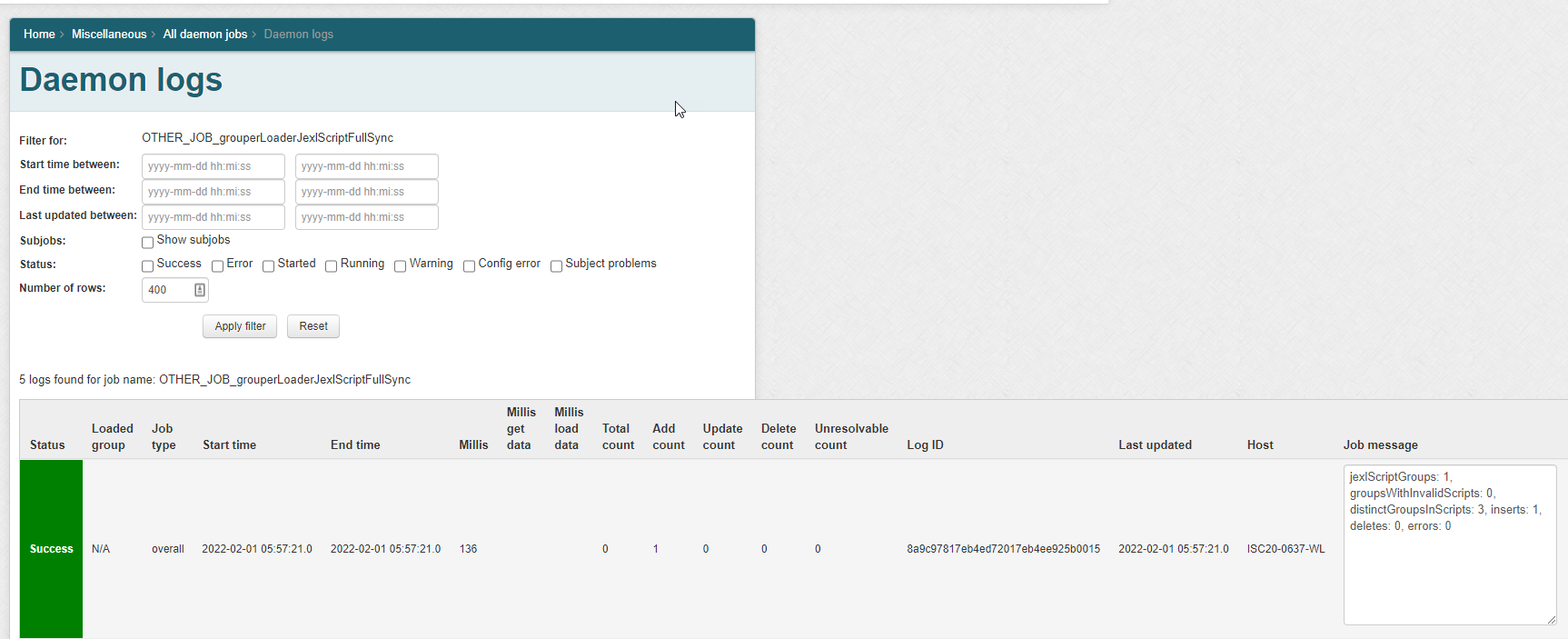| Include Page | ||||
|---|---|---|---|---|
|
Overview
To implement access policies, it has often been necessary to set up intermediate groups, include/exclude, requirement groups, and allow/deny manual groups. Grouper has features to help in this area including: rules, hooks, templates, move/copy, import/export, and GSH scripts.
The ABAC with scripted groups feature is designed to offer increased efficiency in implementing access policies. It's important for the common groups and policy language to be well documented and people to be properly trained.
JEXL loaded groups
In Grouper v2.6.6+ there is a first pass at JEXL loaded groups using memberships of groups only. In v5+ scripted groups can also be based on entity data fields. It is basic and can be built on. Note: this is subject to change as we see a working solution and discuss the optimal path forward.
| Info | ||
|---|---|---|
| ||
For more info, see the February 2022 blog on Attribute Based Access Control with Grouper. |
Expression language (JEXL) scripts facilitate implementing the part of ABAC that defines who is included in a policy based on attributes of those users. Other parts of ABAC such as resource attributes or environment attributes can be taken into consideration with Grouper permissions or by the service which has protected resources.
We want to be able to craft policies by an expression instead of creating loaders or tons of reference groups based on cartesian products of basis/ref groups.
Individual groups can be configured to automatically have their membership managed with individual subject or other basis groups.subjects (or in future groups as members)
Why do we need this feature?
- Reduces pre-loaded rollups that might not be used
- You don't need a loader job for each one of these groups
- Any Grouper user could edit the policies if they can READ underlying groups. The expressions are secure (future state)
- The memberships of the ABAC groups are near real time based on an intelligent change log consumer (future state)
- You can have a UI to help build it and give good error messages
- Could visualize the policies. Perhaps could be integrated into existing visualization (future state)
- This solved
- solves the issue of composites with any number of factors
Expressions
UI to configure
Daemon screen
Note in Grouper v2.6.6 you need to wait an hour after changing a script, or run the JEXL script loader full job. In v5+ an incremental job will adjust the members quicker. Note: there is one full daemon and one incremental daemon that handles all of the JEXL script ABAC groups. You do not add this, it is built-in
Scripts
The script The expression can only be written by people who can READ groups in the abac group/subject tables.
Boolean logic and wildcards are required
...
(group.campus =~ ['palmer', southern'] and termStart - 7 > sysdate and termEnd + 7 < sysdate)
or (person.primaryAffiliation =~ ['faculty', 'staff'] and person.dept =~ ['physics', 'math'])
...
Requirements for expressions
...
Needs to be parsed so we can
check security, do real-time
updates, and analyze policies
...
Seems like JEXL is a good place to start
Expression 1: Campus not in palmer or southern, and term start more than 7 days ago
| Code Block |
|---|
group.campus !~ ['palmer', 'southern'] and group.termStart - 7 > sysdate |
Tables
Two Grouper tables will be constructed for performance reasons (getting relationships and point-in-time)
...
These tables are managed by grouper based on configuration.
Group attribute table
The group attribute values come from the attribute framework which could be automatically fed from external systems of record. For now, an OtherJob could do this on a schedule.
...
Loading attributes to groups
This can use a similar format to the marker / name-value pair convention for attributes, or can just be attributes on groups. i.e. the marker attribute column is optional. Types will be converted (e.g. the varchar "24" will be converted to 24 if the attribute is integer based). Note: dates can be converted to the appropriate type (e.g. from date column to integer seconds from 1970)
...
Subject attribute table
The individual attribute values are fed from basis/ref groups and the values can be transformed from the group name to something that has institutional meaning. This can happen from attribute or from text manipulation
...
Parse expression with JEXL
Feed the expression through this simple program
| Code Block |
|---|
public static void main(String[] args) {
JexlEngine jexlEngine = new JexlEngine();
ExpressionImpl expression = (ExpressionImpl)jexlEngine.createExpression("group.campus !~ ['palmer', 'southern'] and group.termStart - 7 > sysdate");
ASTJexlScript astJexlScript = (ASTJexlScript)GrouperUtil.fieldValue(expression, "script");
printNode(astJexlScript, "");
System.out.println(expression);
}
public static void printNode(JexlNode jexlNode, String prefix) {
System.out.println(prefix + jexlNode.getClass().getSimpleName() + (StringUtils.isBlank(jexlNode.image) ? "" : (": " + jexlNode.image)));
String newPrefix = StringUtils.isBlank(prefix) ? "- " : (" " + prefix);
for (int i=0;i<jexlNode.jjtGetNumChildren();i++) {
printNode(jexlNode.jjtGetChild(i), newPrefix);
}
}
|
Output
| Code Block |
|---|
ASTJexlScript
- ASTAndNode
- ASTNRNode
- ASTReference
- ASTIdentifier: group
- ASTIdentifier: campus
- ASTReference
- ASTArrayLiteral
- ASTReference
- ASTStringLiteral: palmer
- ASTReference
- ASTStringLiteral: southern
- ASTGTNode
- ASTAdditiveNode
- ASTReference
- ASTIdentifier: group
- ASTIdentifier: termStart
- ASTAdditiveOperator: -
- ASTNumberLiteral: 7
- ASTReference
- ASTIdentifier: sysdate |
Grouper can take that object model and see which group and subject attributes are related, print out a nice analysis of the policy, and know which policies are affected by real time changes
Expression 2: campus is palmer or southern, or the term is current with some overlap
| Code Block |
|---|
group.campus =~ ['palmer', 'southern'] or (group.termStart - 7 > sysdate and group.termStart - 7 < sysdate) |
...
| Code Block |
|---|
ASTJexlScript
- ASTOrNode
- ASTERNode
- ASTReference
- ASTIdentifier: group
- ASTIdentifier: campus
- ASTReference
- ASTArrayLiteral
- ASTReference
- ASTStringLiteral: palmer
- ASTReference
- ASTStringLiteral: southern
- ASTReference
- ASTReferenceExpression
- ASTAndNode
- ASTGTNode
- ASTAdditiveNode
- ASTReference
- ASTIdentifier: group
- ASTIdentifier: termStart
- ASTAdditiveOperator: -
- ASTNumberLiteral: 7
- ASTReference
- ASTIdentifier: sysdate
- ASTLTNode
- ASTAdditiveNode
- ASTReference
- ASTIdentifier: group
- ASTIdentifier: termStart
- ASTAdditiveOperator: -
- ASTNumberLiteral: 7
- ASTReference
- ASTIdentifier: sysdate |
script and UPDATE the owner group. Since this is actually a JEXL script (not a JEXL expression), so you could have multiple lines, variables, conditionals, etc
In an entity script, the variable 'entity' is an instance of class: edu.internet2.middleware.grouper.abac.GrouperAbacEntity
You can use entity.memberOf('full:group:id:path') exactly like that to see if user is in a group or not.
| Expression | Description | ||
|---|---|---|---|
| Three part intersection. Full time staff in MFA | ||
| Example policy That means users who are not in globalLockout and not in vpnManualLockout | ||
| Exclusive OR This is VPN users not in MFA and MFA users not in VPN: |
How it works in v5+
The script is parsed and converted to SQL. The results represent the members of the group. The diffs will be added or removed from the group.
Expression 3: campus is palmer or southern, or the term is current with some overlap
| Code Block |
|---|
person.primaryAffiliation =~ ['faculty', 'staff'] and person.dept =~ ['physics', 'math'] |
...
| Code Block |
|---|
ASTJexlScript
- ASTAndNode
- ASTERNode
- ASTReference
- ASTIdentifier: person
- ASTIdentifier: primaryAffiliation
- ASTReference
- ASTArrayLiteral
- ASTReference
- ASTStringLiteral: faculty
- ASTReference
- ASTStringLiteral: staff
- ASTERNode
- ASTReference
- ASTIdentifier: person
- ASTIdentifier: dept
- ASTReference
- ASTArrayLiteral
- ASTReference
- ASTStringLiteral: physics
- ASTReference
- ASTStringLiteral: math |
Analyze policy
To confirm a policy is correct, a long form translation of the policy can be displayed along with group names and group counts
Full sync
A nightly full sync will occur. The incremental sync should stop. Make sure everything in the attribute tables is up to date. Make sure all the policy groups are up to date.
Incremental sync
An incremental change log consumer can
- If group attributes change, see if it affects group attributes
- See which memberships change, if these are related to subject attributes, then update the attribute tables
- If attributes change, see which policies those refer to, and incrementally adjust the membership of those groups
- Policy changes should change the population
Loading groups that are used
...
Policy patterns
Your institution can make a GSH template that will help users setup policies
TODO document this
See Also




